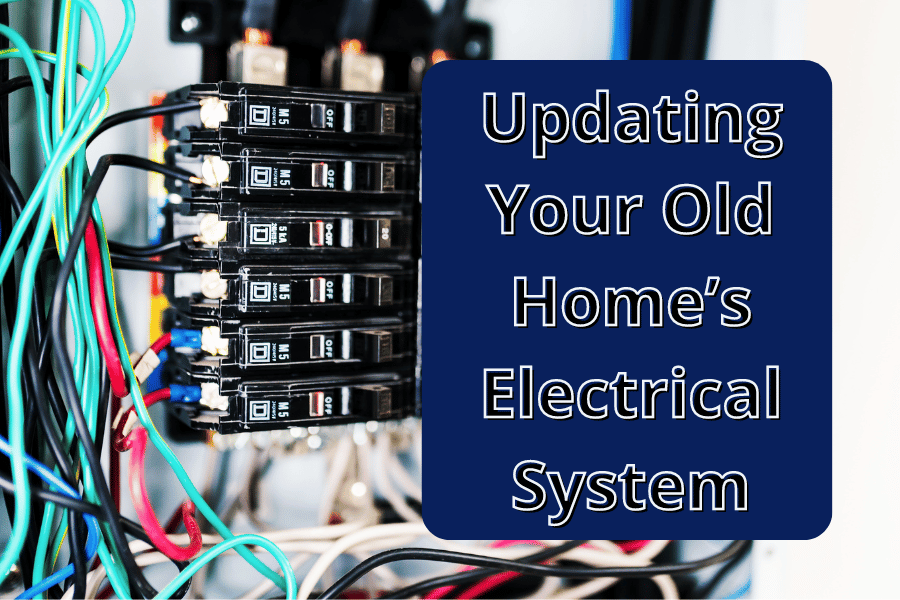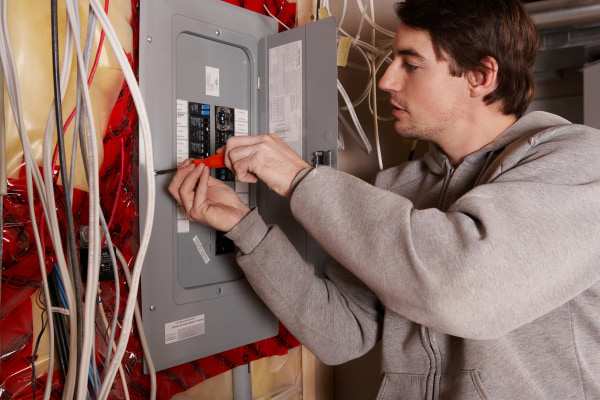
Updating an Outdated Electrical System
Your home's electrical system is the backbone of modern living, powering everything from your lights to your appliances. Yet, it's often an aspect of homeownership that goes unnoticed until something goes wrong. At MSS Ortiz, our residential electricians understand the critical role that a well-maintained electrical system plays in keeping your home safe, efficient, and up to code.
Join our home electrical system experts as we shed light on the signs that indicate your electrical system may need updating, why staying current is crucial, and the process involved in rewiring an old house. Additionally, we'll discuss the cost to rewire a house, providing homeowners with valuable insights to make informed decisions about their electrical systems.

Signs Your Electrical System Needs Updating
Your home's electrical system is like the silent guardian, quietly powering your daily activities. However, just like any other component of your house, it requires regular attention and maintenance to ensure everything runs smoothly and safely. Here are some telltale signs that your electrical system may be due for an update.
Flickering Lights and Outlets
If you notice your lights flickering or dimming, especially when you're using certain appliances or devices, it could indicate issues with your electrical wiring. This could be a sign of loose connections, overloaded circuits, or outdated wiring unable to handle the load.
Frequently Tripping Circuit Breakers
Circuit breakers are designed to trip when they detect an overload or short circuit, cutting off power to prevent electrical fires. However, if you find yourself constantly resetting tripped breakers or experiencing frequent power outages, it's a clear indication that your electrical system is struggling to keep up with your household's demands.
Outdated Wiring Materials
Homes built several decades ago may still have outdated wiring materials like aluminum or knob and tube wiring, which are not as safe or efficient as modern wiring standards. These materials can deteriorate over time, increasing the risk of electrical hazards such as fires and shocks.
Overloaded Circuits
As our dependence on electrical devices grows, older homes may struggle to accommodate the increased demand for power. Plugging too many appliances or devices into a single circuit can overload the system, leading to overheating, tripped breakers, and potential fire hazards.
Presence of Knob and Tube Wiring
Knob and tube wiring, commonly found in homes built before the 1950s, is outdated and poses significant safety risks. This wiring method lacks the grounding system required for modern electrical devices, making it susceptible to insulation degradation, electrical arcing, and fire hazards.
Safety Concerns with Old Fuse Boxes
Fuse boxes, while once standard in older homes, are now considered outdated and potentially hazardous. Fuse boxes lack the safety features of modern circuit breakers, making them more prone to electrical faults and fires. If your home still has a fuse box, it's a strong indicator that your electrical system is in need of an upgrade.
Importance of Updating an Outdated Electrical System
Your home's electrical system is not just a convenience; it's a vital component that ensures the safety, efficiency, and functionality of your living space. While it may be easy to overlook, especially in older homes, keeping your electrical system up to date is crucial for several reasons, including:
- Enhanced Safety
- Improved Energy Efficiency
- Compliance with Building Codes
- Increased Property Value
- Peace of Mind
Electrical Panel Upgrade: The Rewiring Process
Rewiring an old house's electrical system may seem like a daunting task, but with the right approach and expertise, it can be a smooth and rewarding process. At MSS Ortiz, we understand the importance of a well-executed rewiring project for faulty wiring that needs an update, and we're here to guide you through every step of the process.
Inspection and Assessment
Before any work begins, our team of electricians conducts a comprehensive inspection of your home's electrical system. We'll assess the condition of your wiring, outlets, switches, and electrical panels to identify any safety hazards, code violations, or areas in need of improvement.
Planning and Design

Based on the findings of the inspection, we’ll work with you to develop a customized plan for rewiring your home. This may involve determining the optimal placement of outlets and switches, selecting the appropriate wiring materials, and coordinating any necessary permits or approvals.
Removal of Old Wiring
Once the plan is in place, we'll begin the process of removing the old wiring from your home. This may involve dismantling walls, ceilings, or floors to access the wiring hidden behind them. Our team takes great care to minimize disruption to your home and ensure the safety of our work environment.
Installation of New Wiring
With the old, existing wiring removed, we'll proceed to install new, code-compliant wiring throughout your home. This may include running wires through walls, ceilings, and floors, as well as connecting them to outlets, switches, and electrical panels. Our technicians adhere to strict safety protocols and industry best practices to ensure the quality and reliability of our work.
Upgrading Fixtures and Outlets
In addition to rewiring your home, we'll also upgrade any outdated fixtures, outlets, or switches as needed. This may include installing modern light fixtures, GFCI outlets in kitchens and bathrooms, and smart home automation systems for added convenience and functionality.
Testing and Certification
Once the rewiring is complete, our house rewiring team conducts thorough testing to ensure that your new electrical system is functioning properly and safely. We'll check for proper grounding, voltage levels, and circuit continuity to verify compliance with electrical codes and regulations. Upon successful testing, we'll provide you with a certification of compliance for your records.
Factors Affecting Cost to Rewire a House
The cost of rewiring an old house can vary significantly depending on a multitude of factors. While it's challenging to provide an exact estimate without a thorough inspection, understanding the key factors that influence the cost can help you better prepare for your electrical upgrade project. Here are some factors to consider:
Size and Layout of the Home
Larger homes with more rooms and complex layouts may require more extensive wiring and labor, resulting in higher costs compared to smaller, more straightforward layouts.
Accessibility
If your wiring is easily accessible through crawl spaces, attics, or unfinished basements, it may be more straightforward and less expensive to install new wiring. However, if wiring is concealed within walls, ceilings, or floors that require extensive demolition or restoration, the cost may increase accordingly.
Type of Wiring
Older homes may have outdated wiring materials such as knob and tube or aluminum wiring, which may need to be replaced with modern copper wiring for safety and compliance with building codes. The cost of materials and labor for installing new wiring will vary depending on the type and quantity required.
Additional Upgrades
In addition to rewiring your home, you may choose to upgrade other electrical components such as electrical outlets, switches, lighting fixtures, or electrical panels. These additional upgrades can add to the overall cost of the project but may be necessary to ensure the safety, functionality, and aesthetics of your electrical system.
Local Regulations and Permit Fees
Depending on your location, you may need to obtain permits for electrical work, which can incur additional fees. It's important to factor these costs into your budget and work with a licensed electrician who understands and adheres to local regulations.
Labor Costs
Labor costs, including the hourly rates of electricians and the duration of the project, will also contribute to the overall cost of rewiring your home. Factors such as the complexity of the wiring, the skill level of the electricians, and the availability of specialized equipment can all influence labor costs.
Unforeseen Issues
Finally, it's essential to budget for unforeseen issues or complications that may arise during the rewiring process. Hidden wiring problems, structural issues, or unexpected discoveries during demolition can all impact the timeline and cost of the project. Having a contingency fund set aside can help mitigate these unexpected expenses.
For over 40 years
Serving the Greater Raleigh Area
We serve homes and businesses all over Raleigh, North Carolina. If you have a home that needs updating, get a free quote today!
General Cost Estimates for Home Rewiring in Raleigh
Rewiring an old house is a significant investment in the safety, efficiency, and functionality of your home's electrical system. While the cost of rewiring can vary depending on several factors, including the size and condition of your home, accessibility of wiring, and type of materials used, it's helpful to have a general idea of what to expect in terms of costs.
Small to Medium-Sized Home
For a small to medium-sized home with a straightforward layout and relatively good accessibility to wiring, the cost of rewiring typically ranges from $3,000 to $10,000.
Large Home or Complex Layout
For a large home with multiple stories, rooms, and intricate wiring configurations, the cost of rewiring can range from $10,000 to $20,000 or more.
Additional Upgrades
Depending on the scope of the upgrades, you can expect to budget an additional $500 to $2,000 or more for these enhancements.
Local Regulations and Permit Fees
Permit fees typically range from $50 to $200, depending on the scope of the project and local requirements.
Labor Costs
On average, electricians in Raleigh charge between $50 to $100 per hour for their services. The total labor cost will depend on the complexity of the wiring, the skill level of the electricians, and the duration of the project.
Contact Our Experienced Residential Electricians in Raleigh-Durham Today
Ready to upgrade your home's electrical system and ensure the safety and efficiency of your living space? Don't delay—contact MSS Ortiz, your trusted residential electricians in Raleigh-Durham, today.
Our experienced team of professionals is ready to assess your electrical needs, provide personalized recommendations, and deliver top-quality service tailored to your home and budget.
Contact us today for a residential electrical inspection by calling us at (919) 382-0832 or filling out the form below to get started.
Request a Quote Form
We would love to hear from you! Please fill out this form and we will get back to you shortly.
